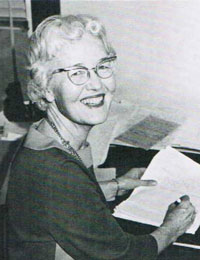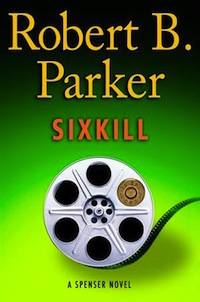 My very first class at Huntington College was Honors Writing. Most freshmen took English Composition, but about 20 of us, probably based on our SAT scores (I never signed up for the class) were placed in Honors Writing. Two of my best lifelong friends, Brian Hughes and Ted Doolittle, were also in that class.
My very first class at Huntington College was Honors Writing. Most freshmen took English Composition, but about 20 of us, probably based on our SAT scores (I never signed up for the class) were placed in Honors Writing. Two of my best lifelong friends, Brian Hughes and Ted Doolittle, were also in that class.
The teacher was Miss Edwina Patton. At that point, she would have been 60 years old. From the start, she spoke with enthusiasm. I’m just delighted that you’re here and we can spend the semester together, and oh, we’re going to have a good time and learn a lot, and I was at this writing seminar over the summer, it was really good, and I wrote this story I’m just dying to tell you about, and let’s get started.
She dressed meticulously, wore perhaps too much lipstick, and seemed just a tad eccentric. But I loved Miss Patton.
Miss Patton was also my faculty advisor. Every semester, I met with her to finalize my next semester’s schedule. She always spent a lot of time going over my options, offering advice, and calling around to make sure the classes I wanted were still open. She put a lot into it, investing herself in me. My friends would tell of quick, cursory meetings with their advisors, who basically just signed off on whatever the student had figured out. Miss Patton was not like that. She cared deeply.
But that was only part of what made her a special advisor. Throughout our meeting, she would shower me with affirmation. As we talked, she would throw in a comment to the effect that she liked me, that I had a lot of talent, that she enjoyed reading my assignments, that I had a great future ahead of me, that it was a pleasure to be my advisor. I always left her office covered with warm fuzzies, feeling exceedingly good about myself. I had just been with somebody who thought I was special and would go out of her way to help me.
There was also some mystery to Miss Patton. She was single, never married, yet she was attractive and smart and talented and kind and utterly likable. I understood that she lived in Bluffton, Ind., with her sister Elizabeth, also a teacher. What was her story? I never heard and never asked, but always wondered.
I don’t know how much potential Miss Patton actually saw in me. At that point, I was just a fairly ordinary student who showed real motivation only in her classes. She didn’t know I would go on to a career in writing. But partly because of her continual affirmation (coupled with a fair amount of conceit in this particular area), I came to believe that I was a genuinely gifted writer.
Miss Patton was in my grandstand, watching my progress and cheering me on. And that continued long after I graduated.
She was excited when I told her I would become assistant editor at the United Brethren Headquarters. “Oh, you’ll do just marvelous,” she would say. And, of course, I believed her.
Miss Patton stopped teaching in 1978, after 18 years at HC, but just couldn’t separate herself from the college. Over the years, I ran into her seven or eight times at Homecoming, Commencement, plays, and other college events. She was always excited to see me, greeting me exuberantly. I would tell her the latest things I’d done and where I’d been published, as if she were my mom and I knew she’d be proud. And indeed, Miss Patton would practically burst with pride, affirming me all over again. Though no longer my teacher, she remained in my grandstand.
Interestingly, even though my ability and credits quickly exceeded Miss Patton’s, I still looked to her for affirmation. Maybe because I knew I would get it. It’s hard to overdose on affirmation.
A teacher can have a tremendous influence not just on a student, but on a life. Few teachers exercise that influence, as Miss Patton did for me. When Miss Patton died at age 82, she left an empty seat in my grandstand. I want everyone to know that I was, and still am, in Miss Patton’s grandstand.


 The Good Soldiers (2009) opens with this paragraph, and you immediately realize you’re in for a literary treat.
The Good Soldiers (2009) opens with this paragraph, and you immediately realize you’re in for a literary treat.


 Sixkill is the last Spenser novel written by Robert Parker before
Sixkill is the last Spenser novel written by Robert Parker before  So Rush Limbaugh appears before God, who asks him the question he learned from Evangelism Explosion, “Why should I let you into my heaven?”
So Rush Limbaugh appears before God, who asks him the question he learned from Evangelism Explosion, “Why should I let you into my heaven?”


